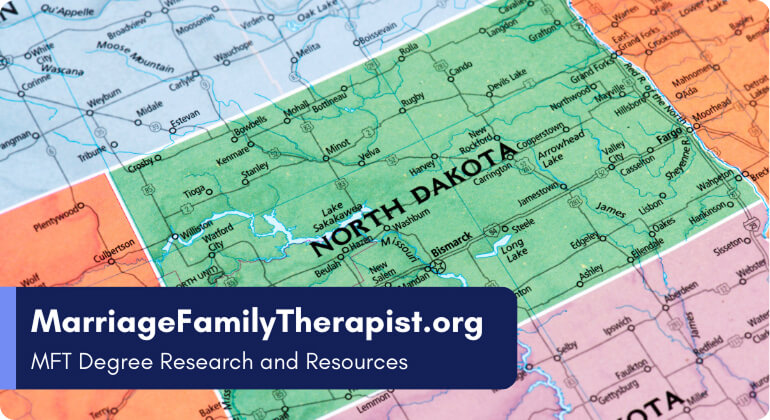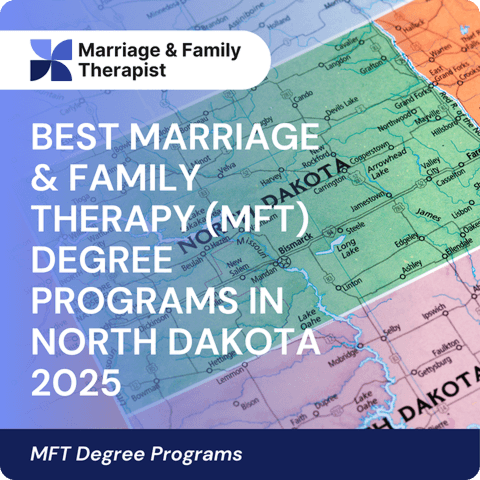Marriage & Family Therapy (MFT) Degree Programs in North Dakota 2025
North Dakota offers limited in-state options for COAMFTE-accredited MFT programs, but students can still pursue regionally accredited programs that align with licensure requirements. The demand for licensed marriage and family therapists (LMFTs) is rising, particularly in rural and underserved communities where mental health professionals are in short supply.
In this guide
MFT Programs in North Dakota
North Dakota has a small but strong selection of accredited MFT programs, ensuring students receive high-quality academic training that meets state licensing requirements.
Top Accredited MFT Programs in North Dakota
University of Mary – Master of Science in Counseling (MFT Focus)
- Regionally accredited but not COAMFTE-accredited, with an option to focus on Marriage and Family Therapy.
- Designed for students who wish to become licensed professional counselors (LPCs) in North Dakota, with an emphasis on family and relationship therapy.
- Provides practical training opportunities in private practice, schools, and healthcare settings.
Additional Considerations
- Online COAMFTE-accredited MFT programs are a great option for students looking for greater flexibility while ensuring they meet North Dakota’s licensure requirements.
- Factors to consider when choosing an MFT program include faculty expertise, clinical placement opportunities, program format (online vs. in-person), and licensure compatibility with North Dakota’s Board of Counselor Examiners.
Why Choose an MFT Program in North Dakota?
- Limited In-State Program Options – North Dakota has one COAMFTE-accredited MFT program at North Dakota State University (NDSU), but students can also pursue regionally accredited options within the state or online.
- Hands-On Clinical Training – Programs in North Dakota provide internship placements in local mental health clinics, hospitals, and private practices, ensuring students gain practical experience before licensure.
- Rural Mental Health Demand – The state offers strong job opportunities for LMFTs, particularly in rural areas and Native American communities where behavioral health services are expanding.
- Online & Hybrid Program Availability – Many students choose online COAMFTE-accredited MFT programs from other states, while completing internship hours in North Dakota to meet licensure requirements.
North Dakota’s Quickest MFT Programs
- NDSU’s MS in MFT can be completed in approximately two years with full-time enrollment, including integrated clinical training in the university’s therapy clinic.
- The University of Mary’s MS in Counseling with an MFT focus can be completed in 2.5–3 years, depending on full-time or part-time enrollment.
- Online COAMFTE-accredited programs from other states allow students to accelerate coursework while completing clinical training locally in North Dakota.
- Students with prior graduate-level coursework in psychology or counseling may transfer credits, reducing their required coursework and program length.
For those looking to complete their degree quickly, choosing a structured program with early clinical experience and full-time study options is the best approach. Check out the fastest MFT programs here.
North Dakota’s Cheapest MFT Programs
- North Dakota State University offers one of the most affordable COAMFTE-accredited MFT programs, making it the best choice for cost-conscious students.
- The University of Mary provides financial aid, scholarships, and employer tuition reimbursement programs, making it an accessible option for students pursuing family therapy-focused counseling degrees.
- Loan forgiveness programs are available for LMFTs who commit to working in rural or underserved mental health settings, helping to reduce student loan debt.
- Online and hybrid programs may offer lower tuition rates, allowing students to balance work and education without excessive financial strain.
Students seeking the most affordable route to an MFT degree should explore state and federal tuition assistance, employer tuition reimbursement, and loan repayment programs for therapists working in high-demand areas.
How to Become Licensed as an LMFT in North Dakota
1. Earn a Master’s or Doctorate in Marriage and Family Therapy
- Complete a COAMFTE-accredited or regionally accredited MFT program that aligns with North Dakota’s licensure requirements.
- Ensure coursework includes family systems therapy, ethics, mental health assessment, and clinical interventions.
2. Complete 3,000 Hours of Supervised Clinical Experience
- Fulfill post-graduate clinical hours, including 1,500 hours of direct client contact under the supervision of a licensed MFT or other mental health professional.
- Work in approved therapy settings, such as community clinics, hospitals, or private practices.
3. Pass the National MFT Examination
- Take and pass the AMFTRB National MFT Exam, which tests clinical competency, ethical practice, and therapy techniques.
4. Apply for Licensure Through the North Dakota Board of Counselor Examiners
- Submit official transcripts, proof of supervised hours, and exam scores for licensure approval.
- Complete any state-mandated additional licensing requirements, including background checks and ethics training.
5. Maintain Licensure with Continuing Education
- Complete 40 continuing education (CE) hours every two years, including coursework in ethics, trauma-informed care, and advanced therapy techniques.
- Attend professional workshops and online training programs to stay updated on best practices in MFT.
This process ensures a smooth transition from student to licensed LMFT, qualifying professionals to work in private practice, healthcare facilities, and rural behavioral health programs. Learn more about how to become an LMFT here.
LMFT Career & Salary Outlook in North Dakota
North Dakota’s mental health workforce is growing, with LMFTs in demand in private practice, hospitals, school-based counseling programs, and teletherapy services. The average salary for LMFTs in North Dakota is $58,200 per year, with experienced professionals earning over $85,000 annually.
Where LMFTs Work in North Dakota
- Urban areas like Fargo and Bismarck offer higher salaries, while rural areas provide loan repayment incentives for therapists.
- LMFTs are employed in diverse settings, including community mental health centers, telehealth services, private practices, and faith-based counseling organizations.
- Loan forgiveness programs help LMFTs working in rural communities, making mental health careers financially viable.
With a growing demand for therapists, financial incentives, and career stability, North Dakota provides an excellent landscape for MFT professionals.
North Dakota offers limited but high-quality MFT program options, with students able to pursue COAMFTE-accredited degrees that meet licensing requirements. With a rising demand for therapists, tuition assistance programs, and expanding teletherapy services, North Dakota is an ideal place for aspiring LMFTs.
For those looking for a structured, affordable, and career-focused education, North Dakota’s MFT programs equip graduates with the knowledge, clinical experience, and professional credentials needed to work in private practice, behavioral health organizations, and school-based therapy programs. Whether serving urban populations or rural communities, LMFTs in North Dakota play a vital role in strengthening the state’s mental health system.


Related Articles
- MFT Doctorate Degrees: DMFT vs PhD – Who Should Pursue Each Path?
- The ROI of an MFT Degree: Analyzing the Financial Investment in Your Therapy Career
- Who Will You Treat as a Marriage & Family Therapist? A Career Guide for Aspiring MFTs
- Support That Affirms: Navigating Mental Health as LGBTQ+
- From Student to Therapist: What to Expect in Your MFT Clinical Internship
- LMFT vs MFT: Is Licensure Necessary for Your Therapy Career?